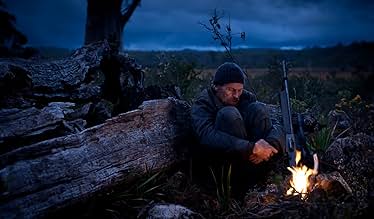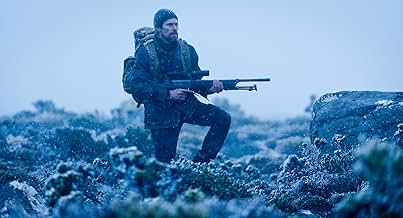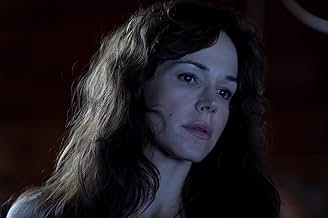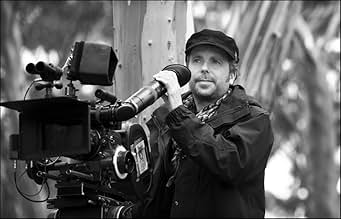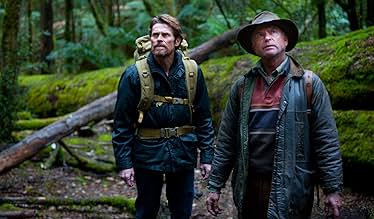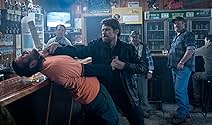Martin, un mercenaire européen à la solde d'une société de biotechnologie anonyme est envoyé en Tasmanie pour capturer le dernier spécimen de tigre de Tasmanie. Cette mission remettra en cau... Tout lireMartin, un mercenaire européen à la solde d'une société de biotechnologie anonyme est envoyé en Tasmanie pour capturer le dernier spécimen de tigre de Tasmanie. Cette mission remettra en cause son travail et sa morale.Martin, un mercenaire européen à la solde d'une société de biotechnologie anonyme est envoyé en Tasmanie pour capturer le dernier spécimen de tigre de Tasmanie. Cette mission remettra en cause son travail et sa morale.
- Réalisation
- Scénario
- Casting principal
- Récompenses
- 4 victoires et 23 nominations au total
Avis à la une
He poses of a researcher from a university and is lodged in the house of Lucy Armstrong (Frances O'Connor). Martin leans that Lucy's husband has been missing for a long time and he befriends her children, Sass (Morgana Davies) and Bike (Finn Woodlock).
When Martin goes to the village, he has a hostile reception from the locals. Along the days, Martin spends his days in the Tasmanian wilderness chasing the Tiger and becomes closer and closer to the Armstrong family. But Red Leaf wants results no matter the costs.
"The Hunter" is a beautiful and dramatic film with an unpredictable and sad plot. The Tasmania landscape is certainly the great attraction of film that is supported by a good story, two lovely children (Morgana Davies and Finn Woodlock) and the excellent Willem Dafoe. It is also great to see again Frances O'Connor, who had disappeared from the "big screen". My vote is seven.
Title (Brazil): O Caçador" "The Hunter")
Visit flickshout.tk
Admittedly, THE HUNTER isn't for all tastes: it's slow indeed, and the essential narrative has a few plot holes and unbelievable bits here and there. But I loved it to bits. The atmosphere building is spot on, and rural Tasmania is brought to life in a wonderful way. The likes of Sam Neill and Dan Wyllie may play stereotypes, but they're entertaining ones, and Frances O'Connor is excellent as a damaged character.
Much of the running time consists of Dafoe stalking through a deserted landscape, and these scenes are exquisitely beautiful with some of the best cinematography I've seen in an Australian movie. The ending is inevitable but tragic nonetheless. A fantastic film overall.
For the life of me, I cannot understand why this film has not received much more praise than it has. Is it visually stunning? Absolutely. The epic scenes of the Tasmanian wilderness, the almost visceral portrayal of encroaching winter, and the sounds that accompany all of this (elevated even higher by the beautiful, soaring musical score by Matteo Zingales), more than met the high expectations I came to this film with. But this all comes, not as the film's great strength, but as part of a package equally impressive nearly across the board.
The Hunter is easy to write off as a successful but simple story, and this would not be inaccurate. But, it is simple only insofar as there is a subtle but deep complexity woven throughout, and to a degree that is hard for any film to achieve. The themes that find a perfectly balanced pitch within this movie are as broad as modern life itself. It touches on environmental issues, family crisis, understated romance, political thriller, and a man's struggle with his own recalcitrant character. And it is all of this without being too much or too little of any of it.
The political relevance is what really amazed me, and I'm equally amazed at how little attention that gets in most reviews. The film is at its core, though almost without any of the typical obnoxious overstatement, a look at the length to which an avaristic corporation (one very much a part of the military-industrial-government complex) will go to get what it wants - the ways it will ruin lives that get in its way without a second thought. It's a military biotech company called Red Leaf in The Hunter, desperate to procure what may very will be the last living Tasmanian Tiger for ownership rights to its DNA. But you could replace Red Leaf with Monsanto or Haliburton or any number of the powerful corporations that have disproportionate influence over world affairs, and you would quickly see the relevance of this plot.
But this is no conspiracy theory film, either - and this is what makes it so wonderful. Red Leaf is there throughout the film, usually concealed subtly behind the backdrop of a much more personal story, but there are no over-exaggerated bad guys in this. Everyone involved in the unfolding story on the ground - our protagonist Martin (Willem Dafoe), his suspicious caretaker Jack Mindy (Sam Neill), the Armstrong family and their eco-warrior friends trying to protect the local wildlife, the loggers with whom they are fighting - is caught somewhere between good and evil. They are all in their own minds justified in what they do and stand for, and all are, to some varying degree, "caught in the middle" of complex world affairs.
There is also tragedy in this film on multiple levels. The driving mimetic object of desire in The Hunter is the elusive Tasmanian Tiger, long declared extinct, but around which rumors of sightings routinely surface, though are never verified. Martin's search for this creature at the behest of Red Leaf is a compelling story in itself, and by the time it reaches its conclusion, you are as invested as he. And then there is the family Martin is lodged with against his will. This is a story in itself, woven seamlessly into the larger tapestry of the movie, and it's through this element that we see Martin transformed from a rugged loner to increasingly affectionate and nuanced man. It's also through this element that we find the touching human spark and our comic relief, most often in the form of an outspoken but joyful little girl and a silent, complex little boy. And of course, there is the struggle of more abstract forces mentioned above: corporate greed, political interests, environmental degradation, economic necessity. All of these well developed elements of the film bring with them their own hopes and tragedies, and by the end, you're not quite sure which has moved you most. It's a broad vista that this film ultimately brings you to, and it is well worth the patient journey it takes you on to get there.
This has been a lengthy review (and I could easily double it's word count), but I want to be somewhat thorough on a film that has so far been much underrated and appreciated. It deserves drawing out all the ways in which it succeeds, for they are many. Please, give The Hunter a viewing. Let the subtle complexity reveal itself like fine red wine.
And to wrap this up: Bravo Dafoe!
Le saviez-vous
- AnecdotesDuring the beginning of this film, actual original black-and-white archival footage is seen of the last ever Tasmanian Tiger living in captivity.
- GaffesPart of the film's premise is that the Tasmanian Tiger (Thylacine) has poison glands. This is false. The Platypus does have poison glands, but the Tiger never did.
- Citations
[last lines]
Martin David: [speaking on a public telephone] What you want is gone forever. Don't bother looking for me. I'm going to see the sights.
- ConnexionsFeatured in The Making of the Hunter (2012)
- Bandes originalesRusalka: Song to the Moon
Written by Antonín Dvorák
Performed by Yvonne Kenny and the Melbourne Symphony Orchestra
Meilleurs choix
- How long is The Hunter?Alimenté par Alexa
Détails
Box-office
- Montant brut aux États-Unis et au Canada
- 176 669 $US
- Week-end de sortie aux États-Unis et au Canada
- 19 032 $US
- 8 avr. 2012
- Montant brut mondial
- 1 680 778 $US
- Durée
- 1h 42min(102 min)
- Couleur
- Mixage
- Rapport de forme
- 2.35 : 1



